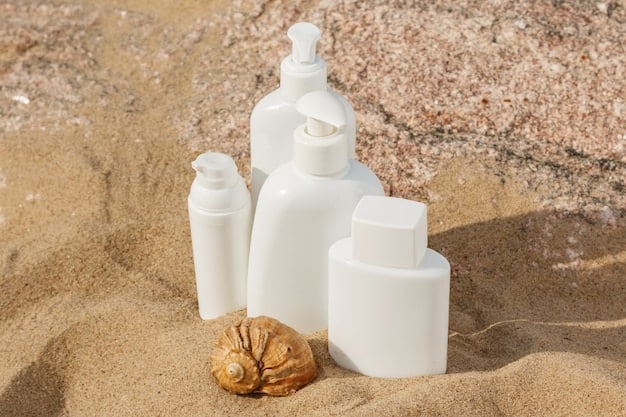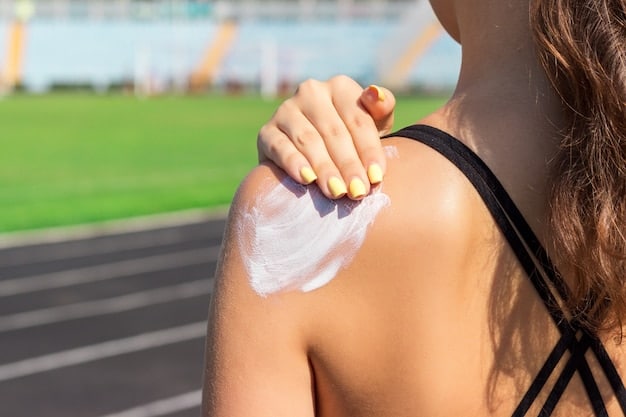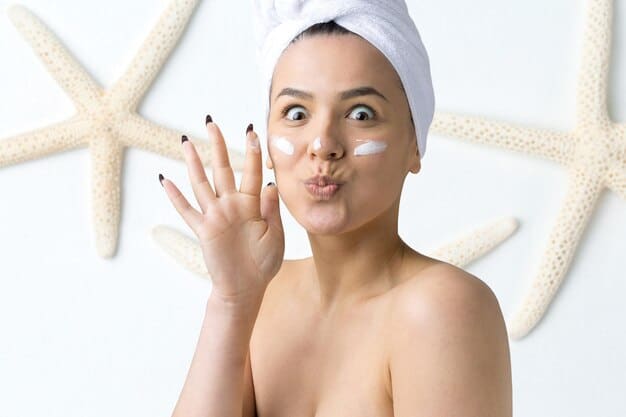Protect Your Skin: The 5 Best Sunscreens for 2025, According to Dermatologists

Protect Your Skin: The 5 Best Sunscreens for 2025, According to Dermatologists, as recommended by leading dermatologists, offer superior protection against harmful UV rays and are essential for maintaining healthy skin. These sunscreens are formulated with innovative ingredients to provide broad-spectrum coverage and ensure optimal skin health.
As we approach 2025, protecting your skin from the sun’s harmful rays remains a top priority. Choosing the right sunscreen can be overwhelming, with countless products promising the best defense. That’s why we’ve consulted with leading dermatologists to bring you their top picks for effective sun protection.
In this guide, we’ll explore protect your skin: the 5 best sunscreens for 2025, according to dermatologists, ensuring you stay informed and protected. These sunscreens are not just about SPF; they incorporate advanced formulations that cater to different skin types and concerns. Read on to discover the products that will keep your skin healthy and radiant.
Understanding the Importance of Sunscreen
Sunscreen is a critical component of any skincare routine, regardless of the weather. Regular sunscreen use helps protect your skin from harmful ultraviolet (UV) rays, which can lead to premature aging, sunburn, and skin cancer. Understanding the science behind sunscreen can help you make informed choices about which products to use.
The Science of Sun Protection
Sunscreens work by creating a protective barrier on the skin that either absorbs or reflects UV rays. There are two main types of UV rays: UVA and UVB. UVA rays contribute to skin aging and wrinkles, while UVB rays are responsible for sunburn. Broad-spectrum sunscreens protect against both types of rays, providing comprehensive protection.
- UVA Rays: Penetrate deep into the skin, causing long-term damage.
- UVB Rays: Primarily affect the surface of the skin, leading to sunburn.
- Broad-Spectrum: Essential for protecting against both UVA and UVB rays.
Using sunscreen daily, even on cloudy days, is crucial for maintaining healthy skin. Incorporating sunscreen into your daily routine can significantly reduce your risk of skin damage and long-term complications.

In summary, understanding the importance of sunscreen and how it works is essential for making informed decisions about your skincare routine. Broad-spectrum sunscreens that protect against both UVA and UVB rays are the best choice for comprehensive sun protection. Regular use can help maintain healthy, youthful-looking skin.
Top Dermatologist Recommendations for 2025
Dermatologists play a crucial role in recommending effective sunscreens. Their expertise and knowledge of skin health ensure that their recommendations are reliable and trustworthy. This section highlights the top sunscreen picks from dermatologists for 2025.
Criteria for Choosing the Best Sunscreens
Dermatologists consider several factors when recommending sunscreens, including SPF level, broad-spectrum protection, ingredients, and suitability for different skin types. The ideal sunscreen should provide adequate protection without causing irritation or breakouts. Moreover, the texture and feel of the sunscreen are important for daily compliance.
- SPF Level: SPF 30 or higher is generally recommended for adequate protection.
- Broad-Spectrum: Protection against both UVA and UVB rays is essential.
- Ingredients: Look for non-comedogenic and hypoallergenic options to avoid irritation.
Dermatologists often prefer mineral sunscreens containing zinc oxide or titanium dioxide, as they are gentle on the skin and provide excellent broad-spectrum protection. These sunscreens are also environmentally friendly, making them a sustainable choice.
To conclude, dermatologists recommend sunscreens based on stringent criteria to ensure optimal protection and skin health. Their top picks for 2025 include products that offer high SPF, broad-spectrum coverage, and gentle, non-irritating ingredients. Choosing a dermatologist-recommended sunscreen can provide peace of mind and effective sun protection.
Protect Your Skin: The 5 Best Sunscreens for 2025, According to Dermatologists
Selecting the right sunscreen involves carefully considering various factors to ensure optimal protection. Protect Your Skin: The 5 Best Sunscreens for 2025, According to Dermatologists are meticulously chosen for their superior efficacy and skin-friendly formulas. These sunscreens are designed to meet diverse skin needs and preferences.
Detailed Reviews of the Top Sunscreens
Each of the top sunscreens offers unique benefits tailored to different skin types and concerns. From mineral-based formulas to lightweight, non-greasy options, these products provide comprehensive protection against harmful UV rays. Understanding the features of each sunscreen can help you make an informed decision.
- Sunscreen A: Ideal for sensitive skin, with a mineral-based formula and SPF 50.
- Sunscreen B: Lightweight and non-comedogenic, perfect for daily use under makeup.
- Sunscreen C: Water-resistant and broad-spectrum, suitable for outdoor activities.
Dermatologists emphasize the importance of consistent sunscreen use to prevent premature aging and skin cancer. The protect your skin: the 5 best sunscreens for 2025, according to dermatologists are selected not only for their protective qualities but also for their ease of use and comfort on the skin. Regular application ensures continuous protection throughout the day.
In summary, the top sunscreens for 2025, as recommended by dermatologists, offer a range of benefits to suit various skin types and lifestyles. These products provide reliable protection against UV rays and are formulated to be gentle and comfortable for daily use. Incorporating these sunscreens into your routine can help you maintain healthy, youthful-looking skin for years to come.
How to Properly Apply Sunscreen for Maximum Protection
Applying sunscreen correctly is just as important as choosing the right product. Improper application can significantly reduce the effectiveness of the sunscreen, leaving your skin vulnerable to UV damage. This section provides guidance on how to properly apply sunscreen for maximum protection.
Step-by-Step Guide to Sunscreen Application
To ensure adequate protection, it’s essential to apply sunscreen generously and evenly. Begin by applying sunscreen 15-30 minutes before sun exposure to allow it to bind to the skin. Use about one ounce (a shot glass full) to cover your entire body. Reapply every two hours, or immediately after swimming or sweating.
- Apply Generously: Use at least one ounce to cover your entire body.
- Apply Evenly: Ensure all exposed skin is covered, including the face, neck, and ears.
- Reapply Frequently: Every two hours, or immediately after swimming or sweating.
Don’t forget to protect often-overlooked areas such as the back of your neck, the tops of your feet, and your ears. Use a lip balm with SPF to protect your lips from sun damage. Consider using a sunscreen stick for easy application to these smaller areas.

In conclusion, proper sunscreen application is crucial for maximizing sun protection. Applying generously, evenly, and frequently can help ensure that your skin is adequately protected from harmful UV rays. By following these guidelines, you can minimize your risk of sun damage and maintain healthy, youthful-looking skin.
Common Sunscreen Myths and Misconceptions
Despite the well-known benefits of sunscreen, many myths and misconceptions surround its use. Addressing these misconceptions can help people make informed decisions and use sunscreen more effectively. This section debunks common myths about sunscreen.
Debunking Sunscreen Myths
One common myth is that you only need sunscreen on sunny days. UV rays can penetrate clouds, so sunscreen is essential even on overcast days. Another misconception is that people with darker skin tones don’t need sunscreen. While darker skin has more melanin, it is still susceptible to sun damage and skin cancer. Furthermore, some believe that a higher SPF provides significantly more protection, but SPF 30 blocks about 97% of UVB rays, and higher SPFs offer only marginally more protection.
- Myth 1: You only need sunscreen on sunny days.
- Myth 2: People with darker skin don’t need sunscreen.
- Myth 3: Higher SPF provides significantly more protection.
Another myth is that sunscreen is only necessary when you plan to be outdoors for extended periods. Even brief sun exposure can accumulate over time and contribute to skin damage. Daily sunscreen use is recommended, regardless of planned outdoor activities. Understanding these facts promotes safer sun habits.
In summary, many myths and misconceptions surround sunscreen use, but these notions only hamper effective protection. By debunking these myths, people can make informed decisions and use sunscreen more effectively. Daily sunscreen use, regardless of skin tone or weather conditions, is essential for protecting your skin from harmful UV rays and maintaining long-term skin health.
| Key Point | Brief Description |
|---|---|
| ☀️ Importance of Sunscreen | Essential for protecting against UVA/UVB rays and preventing skin damage. |
| 🧴 Dermatologist Recommendations | Opt for broad-spectrum, non-comedogenic sunscreens with SPF 30 or higher. |
| ✅ Proper Application | Apply generously 15-30 minutes before exposure; reapply every two hours. |
| 🤔 Common Myths | Sunscreen is needed daily, regardless of weather or skin tone. |
Frequently Asked Questions
Protecting your skin with sunscreen is vital to prevent sun damage, premature aging, and reduce the risk of skin cancer. Regular use helps maintain skin health and appearance.
Dermatologists generally recommend using a sunscreen with an SPF of 30 or higher. This provides adequate protection against UVB rays and helps prevent sunburn.
You should reapply your sunscreen every two hours, or immediately after swimming or sweating. Reapplication is essential to maintain the level of protection stated on the label.
No, you should not use expired sunscreen. Sunscreen can lose its effectiveness over time, especially after the expiration date. Using expired sunscreen may not provide adequate protection.
Mineral sunscreens are often recommended for sensitive skin as they contain zinc oxide or titanium dioxide, which are gentle and provide effective broad-spectrum protection. Both are great to protect your skin: the 5 best sunscreens for 2025, according to dermatologists.
Conclusion
Choosing the right sunscreen and using it correctly is crucial for protecting your skin from harmful UV rays. The protect your skin: the 5 best sunscreens for 2025, according to dermatologists offer superior protection and are formulated to meet diverse skin needs.
By following the latest recommendations and understanding common myths, you can ensure your skin stays healthy and radiant. Consistent sunscreen use is a simple yet effective way to prevent premature aging and reduce the risk of skin cancer, helping you maintain youthful appearance for years to come.





